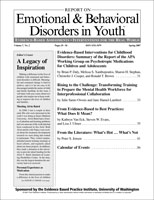Family Interventions to Reduce Problem Behavior in Public Middle Schools: A Multilevel Ecological Approach
Author: Thomas J. Dishion, PhD.
Source: Volume 06, Number 02, Spring 2006 , pp.29-40(12)

< previous article |next article > |return to table of contents
Abstract:
A major tenet of prevention science is that a program of research that tightly links developmental and intervention research is likely to provide effective strategies for reducing child and adolescent maladjustment and preventing the occurrence of more serious forms of problem behavior such as delinquency, antisocial behavior, school withdrawal, substance use, and deviant peer association. Problem behavior in adolescence is particularly salient because of the possible social-emotional and academic harm to the youth, as well as potential life course implications and eventual costs to society. Developmental models and intervention outcome studies concur in suggesting that family-centered intervention is a viable strategy for reducing risk in adolescence. Specifically, supporting caregivers’ behavior management skills and building strong parent-child relationships reduce problem behavior and substance use in early adolescence.Keywords:
Affiliations:
1: University of Oregon.